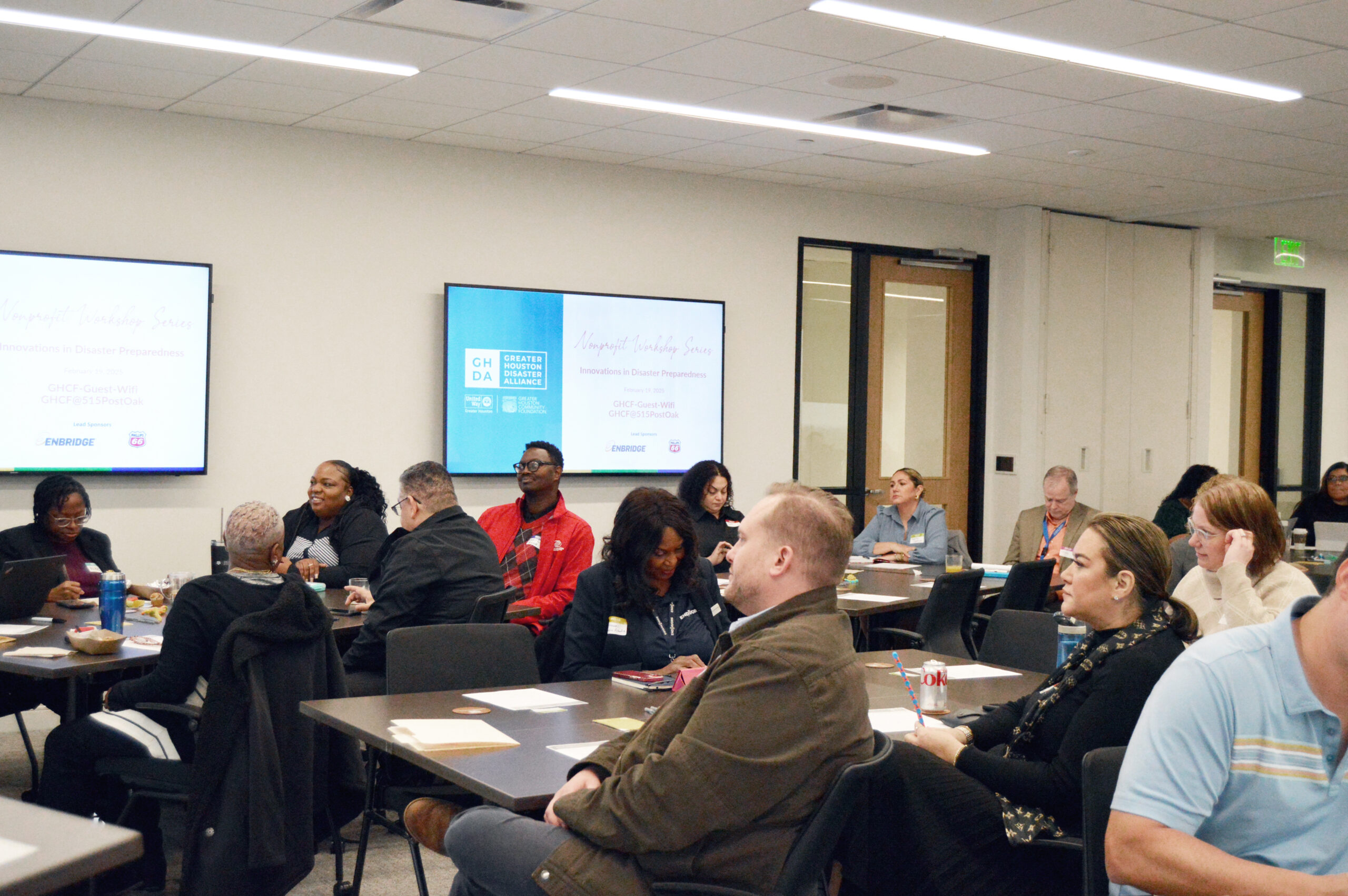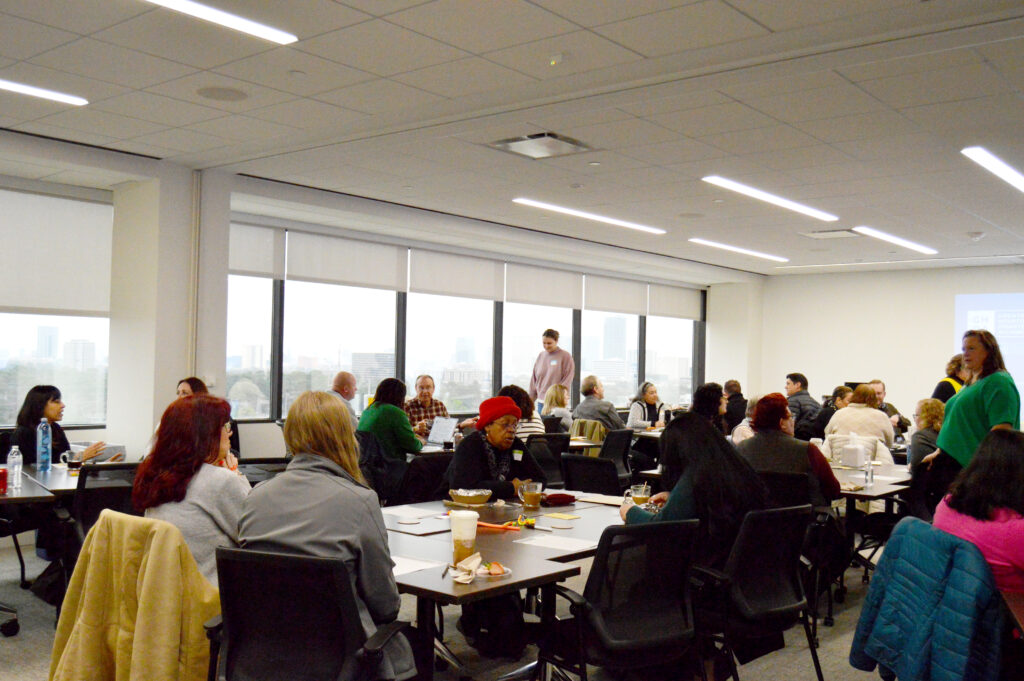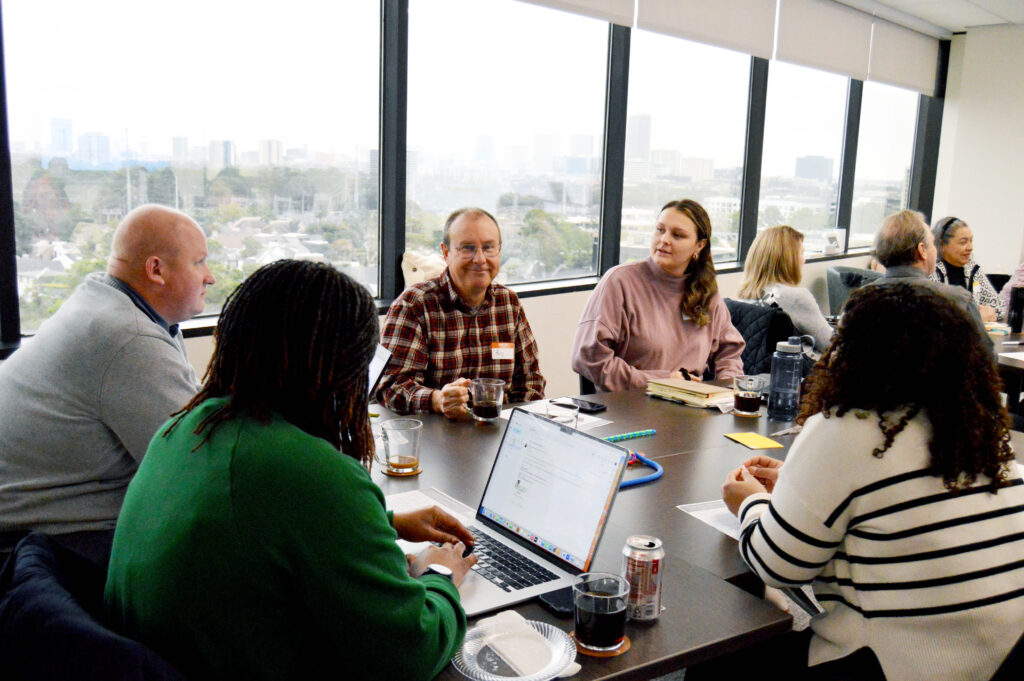Nonprofit Workshop Series: Innovations in Disaster Preparedness

Greater Houston Disaster Alliance (Disaster Alliance) hosted an event at the Foundation, bringing together leaders of nonprofit organizations who aid our community during and in the aftermath of disasters. This event focused on delivering preparedness resources to the Disaster Alliance’s nonprofit network as we approach hurricane season.
With over 35 years of combined experience leading disaster recovery efforts, Greater Houston Community Foundation and United Way of Greater Houston formed the Greater Houston Disaster Alliance in 2023 to ensure the region has the networks and systems in place to accelerate recovery effectively and equitably in times of disaster. Through an initial investment from Enbridge and Phillips 66, the Disaster Alliance catalyzes public and private partnerships and brings year-round focus to disaster preparedness and resiliency to reduce the harms caused by disaster on our most vulnerable residents.
Prioritizing Key Disaster Preparedness Initiatives
In November 2024, the Disaster Alliance convened 70 nonprofit leaders from 38 nonprofits to provide feedback about how it could improve processes and programming related to emergency financial assistance, resource navigation, and home repair. The design thinking sessions on these three program areas were facilitated by Connective, and resulted in the following nine recommendations:
- Reserve funds for unmet construction needs
- A common application for emergency financial disaster assistance
- A multi-tiered approach to resource navigation
- A universal home repair assessment form
- Improved collaboration among grantees
- Extended grant periods for disaster recovery grantees
- A home repair acceleration pilot program
- Standardized criteria for emergency financial assistance per household
- More guidance for resource navigation grantees
Attendees were asked to prioritize these recommendations for implementation ahead of this year’s hurricane season. The insights provided by nonprofits are invaluable in shaping effective disaster response strategies, and the Disaster Alliances greatly values and appreciates the contributions of everyone involved.

Design-Thinking Lightning Session
Attendees engaged in a design-thinking lightning session to begin ideating on the challenge of communicating critical disaster information before, during, and after a disaster event, to vulnerable populations.
Problem Statement
Vulnerable populations often lack access to critical information during disasters, including information on preparedness, emergency and first responder resources, relief, and recovery. This leaves them unaware of available resources that could aid in their safety and recovery. Currently, most information is disseminated through traditional channels like local news, social media, or e-newsletters from government agencies and community-based organizations (CBOs), such as nonprofits and faith-based groups. While some CBOs conduct wellness checks via phone calls and even fewer engage in door-to-door outreach, these efforts are limited in scale. This means that many of those who need this information most—individuals who rely on public and private services for disaster recovery—are often the least likely to receive it.
Addressing Vulnerable Populations
While we know that many vulnerable populations need improved methods of communication regarding disaster, for the purposes of this exercise, attendees collectively identified the following four vulnerable populations for consideration: A critical component of the session was having the attendees identify, based on their experience serving these different populations, which of the below populations are least likely to receive disaster preparedness messages and resources. Vulnerable groups that attendees identified included:
- Homebound seniors
- Limited English proficiency
- People experiencing homelessness
- Very low-income
Then, participants were divided into groups to brainstorm innovative ways to improve communication and preparedness efforts for these populations. Attendees had opportunities to respond to the guiding questions individually and then share with their assigned group. Some of the guiding questions were:
- Reframing the problem: How might we [problem statement] for [assigned populations]?
- Ideate: What solutions might there be to your “How Might We…” question?
- Prototype: Discuss the pros and cons of each top proposed solutions.
After meaningful small group discussions, the Disaster Alliance team collected their proposed solutions to explore how these ideas could be integrated into their work. In addition, attendees were encouraged to share one of the “big ideas” with colleagues or leaders within their nonprofit organization. The Disaster Alliance plans to synthesize the insights provided by attendees and share back with nonprofits at a future date.

Spotlight Sessions
This workshop also featured three nonprofit leaders from the disaster preparedness and response space who shared their stories.
Empowering Staff to Pivot Post-Disaster
Mark Brown, the CEO of West Houston Assistance Ministries, spoke to the attendees about having key discussions centered around empowering staff to take immediate action in times of crisis, rather than waiting for leadership direction. He spoke about encouraging self-organization, where every staff member, regardless of tenure, should feel empowered to act during a crisis without waiting for leadership.
To create a culture of adaptability and self-organization, nonprofits must prepare in advance, ensuring that team members understand their roles during “blue sky days,” before a disaster strikes or “grey sky days.” This self-organization can be done through promoting trust and collaboration and prioritizing action over perfection. In disaster situations, waiting for perfect information can delay crucial responses. Acting with the best available information is essential.
Positioning Residents as Preparedness Leaders
Doris Brown, President at West Street Recovery and co-founder of the Northeast Action Collective, spoke to the group about positioning residents and preparedness leaders for disasters through community engagement and its innovative “Hub House” model. The aim is to prepare for future disasters, prioritizing the most vulnerable and building networks of solidarity and mutual aid.
West Street Recovery’s seven Hub Houses, primarily located in Northeast Houston, can serve as emergency resources, evacuation, and distribution centers during disasters or power outages. The Hub House system aims to fill a critical gap in traditional or government-run shelters and emergency protocols in Houston. Each Hub House is led by a block captain (a resident and usually a community leader) who has volunteered their time and home. Block captains welcome neighbors into the hub and lead communications and rapid response during disasters.
Through its Hub Houses initiative, West Street Recovery serves vital resources, providing training, emergency supplies, and community organization to ensure residents are ready for disasters. West Street Recovery intends to continue to grow this initiative throughout Houston, with one location that has already opened in Southeast Houston. These grassroots efforts demonstrate how community-led initiatives can significantly improve disaster preparedness and resilience at the local level.
ToolBank: Tool Lending + Training + Disaster Support
Nancy Clippard, Director of Operations at Houston Community ToolBank (ToolBank), spoke about how the ToolBank is an equipment, tool, and resource lending library for community-based organizations in our region. The ToolBank aims to build capacity in the nonprofit sector by reducing resource-related costs so nonprofits can direct their funding towards mission-focused activities and not towards renting equipment.
Founded in 2014, the Houston ToolBank is 1 of 8 ToolBanks across the country, all affiliates of ToolBank USA. Since its inception, the ToolBank has shared more than 429,000 tools with its partners, offering over 300 types of tools. In addition to tool distribution, they provide pre-disaster training on roof tarping, weatherproofing, and emergency preparedness.
Over the years, the ToolBank has grown significantly in response to disasters. Still, there have been missed opportunities when it was unable to get items out ahead of the storm. The ToolBanks’ Disaster Preparedness Program addresses this delay by partnering with disaster response groups and community leaders to pre-position tools in neighborhoods most likely to be impacted by a disaster, adequately equipping them for a timely response.
Clippard encouraged all attendees to visit the Disaster Preparedness Program website to become a member, review their tool inventory, and pre-order equipment before disaster strikes. She reiterated that early communications and partnership can lead to immediate access to critical recovery equipment.
Moving Forward: Next Steps for a More Resilient Community
As we approach hurricane season, it’s crucial to continue these discussions and implement the innovative solutions identified during the event. The Disaster Alliance will review the proposed solutions and explore how to integrate them into ongoing disaster preparedness and response efforts.
In the meantime, the Disaster Alliance encouraged attendees to think about their specific roles when disaster strikes, discuss preparedness ideas with colleagues, and register with the ToolBank. Greater Houston has and will continue to face the risk of extreme weather events due to our Gulf Coast vicinity. By working together, we can build a stronger, more resilient community prepared to face any challenge that comes our way. Learn more preparedness tips by visiting the Disaster Alliance website.
Helping Those In Need
There are a number of ways that Greater Houston Community Foundation can facilitate disaster giving for donors. Foundation donors can give directly to nonprofit disaster giving organizations through their donor advised funds — including Greater Houston Disaster Alliance. For those that do not have a donor advised fund, we encourage you to contribute directly to the Greater Houston Disaster Alliance. Corporations can also start employee donor advised funds to support the ongoing needs of employees affected by disasters. If you or a loved one are looking to make a difference in the region and would like to learn more about the Greater Houston Disaster Alliance, call us at 713-333-2210 or reach out directly to get started.
More Helpful Articles by Greater Houston Community Foundation:
- 30 Years of Amplified Giving: Insights from the CEO
- Tips for Disaster Giving
- Building Community Resiliency: Our Disaster Response Journey
This website is a public resource of general information that is intended, but not promised or guaranteed, to be correct, complete, and up to date. The materials on this website, including all comments and responses to comments, do not constitute legal, tax, or other professional advice and are not intended to create, and receipt or viewing does not constitute, nor should it be considered an invitation for, an attorney-client relationship. The reader should not rely on the information provided herein and should always seek the advice of competent legal counsel and/or a tax professional in the reader’s state or jurisdiction. The owner of this website does not intend links on the website to be referrals or endorsements of the linked entities.